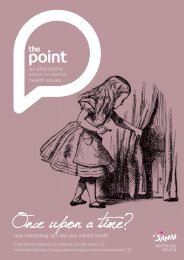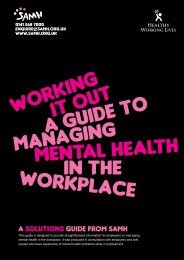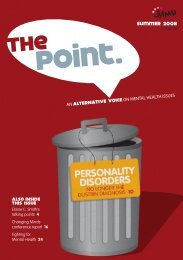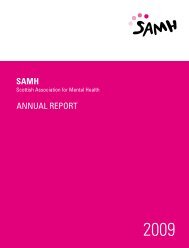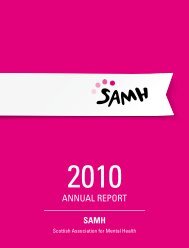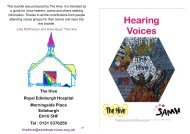CONTENTS
Untitled - Scottish Association for Mental Health
Untitled - Scottish Association for Mental Health
Create successful ePaper yourself
Turn your PDF publications into a flip-book with our unique Google optimized e-Paper software.
Alanna highlighted some startling statistics; around 2 people per day die by<br />
suicide in Scotland and suicide remains the leading cause of mortality in those<br />
under the age of 35 years. The National programme has a number of key<br />
elements aimed at reducing suicide; including the provision guidance and<br />
training, as well as improving understand through research and the sharing of<br />
effective practice. One of the objectives of the National Programme is also to<br />
identify and intervene to reduce suicidal behaviour in high risk groups.<br />
Alanna explained that Choose Life had identified a number of high risk groups,<br />
including people misusing substances – especially alcohol – and those with coexisting<br />
mental illness and substance misuse. This risk was increased further<br />
for people in psychiatric care, or who had recently been discharged.<br />
There were a number of actions which Alanna identified could be taken in<br />
response. This included raising awareness about the risks and targeting people<br />
in high risk groups, as well as the people who work with and support them.<br />
There is a need to improve co-ordination of interventions to ensure a better<br />
response. Also, work must begin to identify and understand the trends, which<br />
could be facilitated through the development of a Scottish Suicide Information<br />
Database.<br />
Patrick Shearer<br />
Patrick Shearer, President of the Association of Chief Police Officers in Scotland<br />
(ACPOS) and Chief Constable of Dumfries & Galloway Constabulary, gave a<br />
policing perspective on alcohol and mental health. He began by commenting that<br />
62% of offenders of violent crime in Scotland were under the influence of alcohol,<br />
12% higher than in England. He explained that the police are all too familiar with<br />
the social harms of alcohol - anti-social behaviour, domestic abuse etc - and the<br />
impact that it can have on mental health, including links with self-harm.<br />
ACPOS have set up a specific Mental Health Group to help ensure that the<br />
Scottish Police Service is equipped to respond effectively to psychiatric<br />
emergencies, and provide the best possible service to people with experience of<br />
mental health problems. Patrick explained that the police often have to arrest<br />
people in distress if it is suspected that they may pose a danger to themselves or<br />
to others. However, sometimes the decision to arrest can be taken because of a<br />
lack of other options, such as a shortage of hospital beds. This situation can be<br />
further compounded by alcohol use as hospital staff will often not admit a person<br />
who is under the influence of alcohol, leaving the police with no option but to hold<br />
people in police cells.<br />
Patrick highlighted that custody is not the most suitable place for people who<br />
need care and discussed the need to evolve to meet future challenges. Mental<br />
health services in the community need to be developed to ensure that they are<br />
equipped to meet people’s needs, regardless of whether they are under the<br />
influence of alcohol or not. This will require a more integrated system with<br />
creative budgeting, a multi-agency approach and better collaborative working.<br />
6




